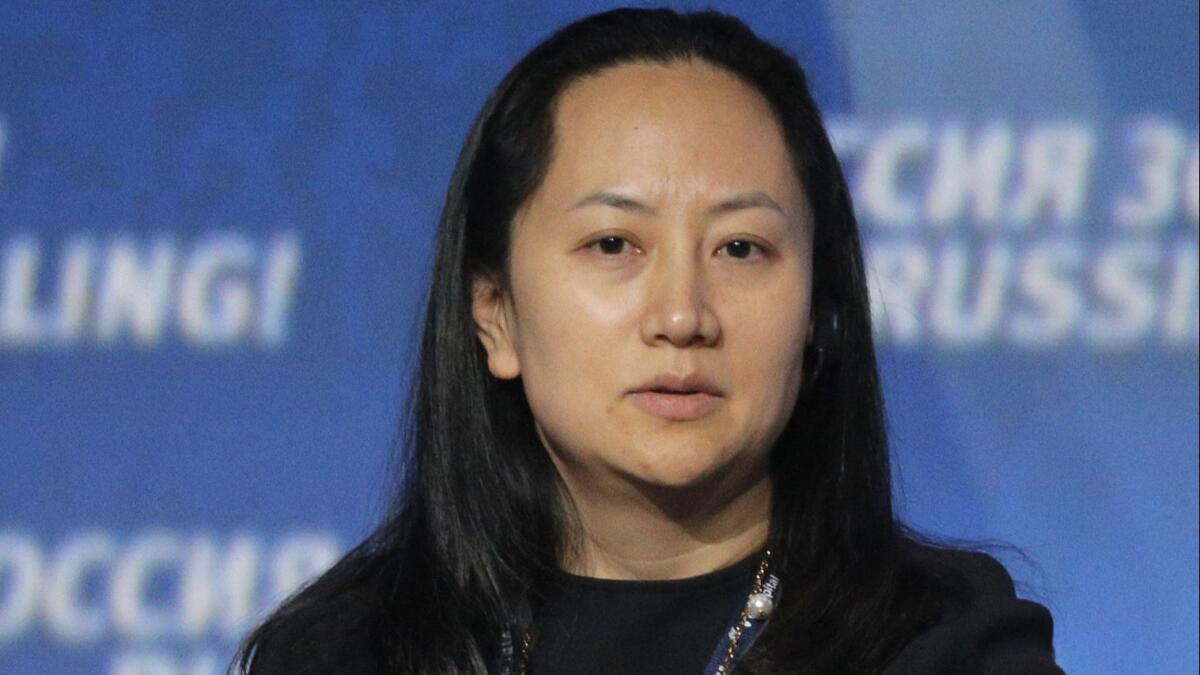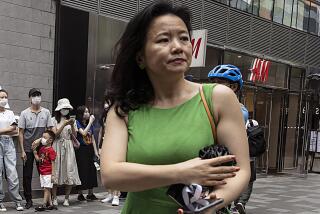Canadian judge signals he is not sure Huawei executive should be granted bail

- Share via
A Canadian judge signaled Monday that he wasn’t satisfied that the bail conditions sought by jailed Huawei Technologies Co. Chief Financial Officer Meng Wanzhou would prevent the executive from fleeing to China.
In a case that’s being closely followed on both sides of the Pacific, Justice William Ehrcke voiced doubts that Meng’s husband could act as her surety, meaning he would guarantee she would attend all required court appearances.
Ehrcke adjourned the hearing, which began on Friday, without making a decision. It is scheduled to resume Tuesday.
Meng was arrested Dec. 1 at the request of U.S. authorities during a stopover in Vancouver on her way to Mexico. The 46-year-old mother of four is accused of guiding a global effort by the Chinese telecom giant to mask violations of sanctions on sales to Iran.
It’s an unprecedented action to hold accountable a senior executive who’s considered part of China’s inner circle — the daughter of billionaire Huawei founder Ren Zhengfei. And it comes amid tense negotiations between Washington and Beijing to avert higher U.S. tariffs on $200 billion worth of Chinese goods.
Earlier at the British Columbia Supreme Court hearing, Meng’s lawyer had said the executive’s husband, Liu Xiaozong, would post bail equal to $11 million in cash and equity in the couple’s homes in Vancouver to gain her release from jail while she contests possible extradition to the U.S.
The couple own two homes valued at more than $15 million, according to property records and an affidavit from Meng. Liu also would ensure she complies with the terms of her confinement imposed by the court, attorney David Martin said.
“She is a woman of character and dignity,” Martin told the court. “She would comply with your order.”
In response, Ehrcke asked Martin how Liu could possibly serve as his wife’s “jailer,” particularly if the judge couldn’t order Liu to remain in the country. Martin said he wasn’t aware of Liu’s immigration status in Canada.
Expert witness Scot Filer had testified earlier on behalf of the Chinese executive to explain how Meng’s whereabouts could be secured if she were released.
The chief executive of Lions Gate Risk Management Group and a former member of the Royal Canadian Mounted Police told the court that using technology and two security officers at a time, as well as a driver, to oversee Meng’s whereabouts would minimize the flight risk.
“I’m very confident what we will have in place will satisfy the court,” he said.
Meng would pay for the security operations as an added layer of assurance she would remain in the country if granted bail, Martin told the court.
Her defense team also points out that Meng’s only two valid passports — from China and Hong Kong — have already been confiscated, preventing her from boarding commercial flights. The only place she could flee to by land is the U.S., the very country that seeks her extradition.
Crown attorney John Gibb-Carsley has argued against granting Meng bail because she’s so wealthy that she will easily be able to pay whatever is required and then flee. Meng’s father’s net worth was estimated by the prosecutor at $3.2 billion.
The prosecutor said a $1-million bail to the family is equivalent to a bail of about $117 for an upper-middle-class Canadian family with some $375,000 in assets.
“I’m not saying that wealthy people can’t get bail,” he had argued Friday at a six-hour bail hearing before more than 100 spectators. “But I’m saying in terms of magnitude to feel the pull of bail, we are in a different universe.”
Meng’s lawyers have argued their client has no criminal record, cited high-profile character witnesses to vouch for her and say she has substantive ties that ensure she would remain in Vancouver, a home to many Chinese nationals.
The city plays a special role for Meng — as it does for many wealthy Chinese nationals. It’s a place where she has bought property, educated her children and let her hair down from time to time.
Meng would carve a few weeks out of her punishing travel schedule every year for a break in the city, according to court documents. She’d time it for the summer, when her children would be there. In August she was seen strolling through a local park, snapping photos with her in-laws.
The couple bought a six-bedroom house in the city in 2009 that’s now assessed at $4.2 million, according to property records and an affidavit by Meng read aloud in court. In 2016, they bought a second property, a brick-and-glass mansion set in a 21,000-square-foot lot assessed at about $12.2 million. Purchased with mortgages from HSBC, she has offered to post the family’s equity in both as part of her bail.
Meng’s team also outlined her health issues in unusual detail. A survivor of thyroid cancer who also suffers from severe hypertension and sleep apnea, she needs daily access to drugs, they said.
“I continue to feel unwell and I am worried about my health deteriorating while I am incarcerated,” Meng said in a filing. “I currently have difficulty eating solid foods and have had to modify my diet to address those issues. My doctor has for years provided me with daily packages of medications.”
The hearing in Vancouver is the start of a long legal process in Canada that could end with Meng being sent to the U.S. to stand trial. Even though the North American neighbors have a longstanding treaty governing extradition, it can take months, even years, for a defendant to be handed over, if at all.
Should a judge agree to extradite Meng, she would have multiple chances to appeal the decision.
Beyond her health and local ties, Meng’s attorneys have attacked the central premises in the case against her: that she conspired to defraud banks — including HSBC — so that they unwittingly cleared millions of dollars in transactions linked to Iran, in violation of U.S. sanctions.
They say it was Huawei’s legal team — rather than its finance team — that prepared a PowerPoint presentation on Iran that Canadian prosecutors have held up as evidence that she was complicit in an internal attempt to flout sanctions.
More to Read
Inside the business of entertainment
The Wide Shot brings you news, analysis and insights on everything from streaming wars to production — and what it all means for the future.
You may occasionally receive promotional content from the Los Angeles Times.








